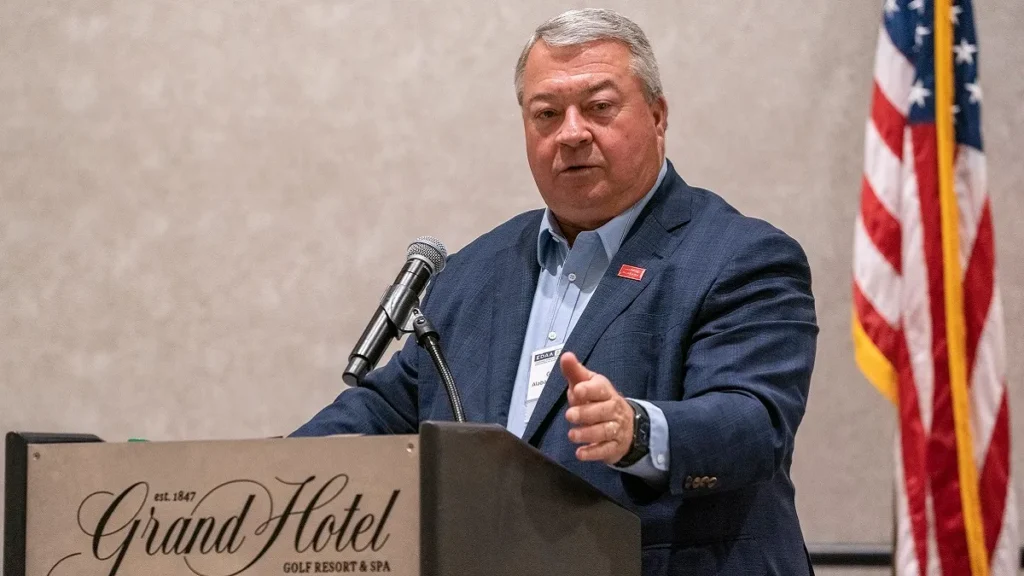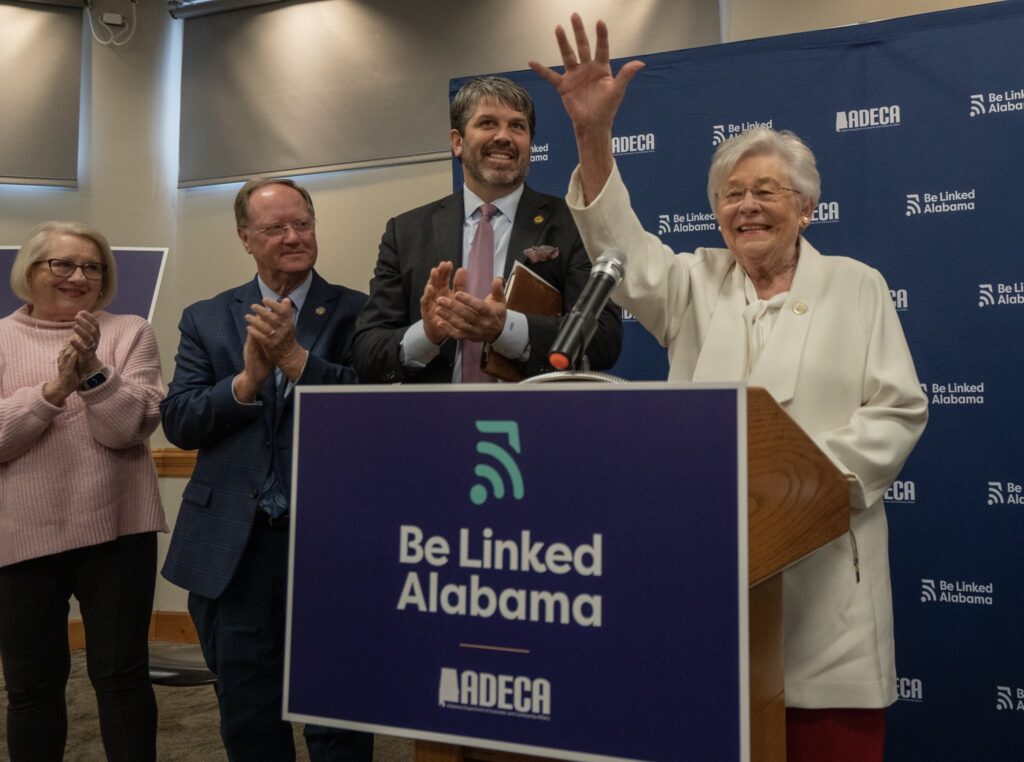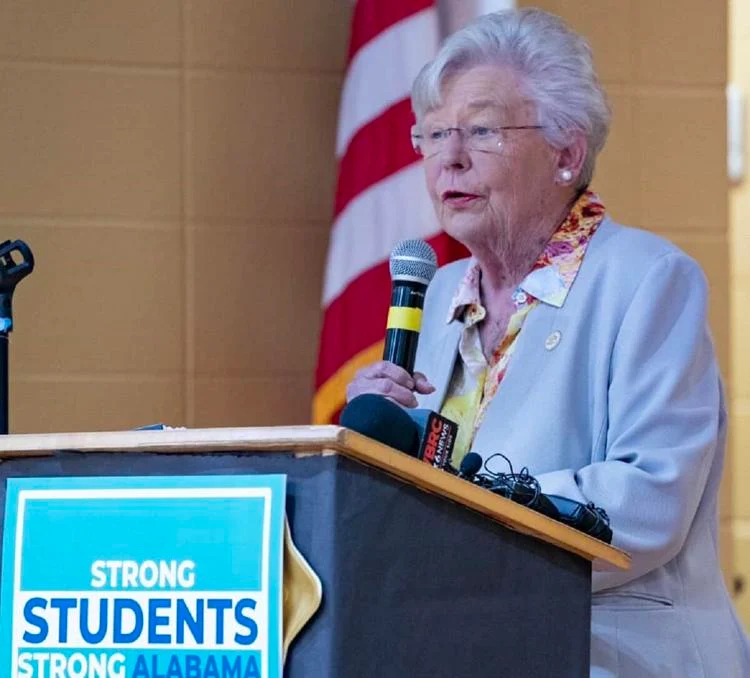Alabama and Georgia settle long-running Chattahoochee river water lawsuit

On Tuesday, Governors Kay Ivey (R-Alabama) and Brian Kemp (R-Georgia) announced that they have reached an agreement with the United States Army Corps of Engineers, which is expected to finally settle a lawsuit brought by Alabama while assuring both states’ citizens who live and work in the Mid- and Lower Chattahoochee River Basin of sufficient minimum water flows during times of drought. “This agreement is a win-win for our states, with neither side sacrificing what is important to them,” said Governor Kemp. “The Chattahoochee River is the lifeblood of southwest Georgia, and this proposal would give citizens and businesses certainty about the flow of water they need for business and leisure alike. Just as significant, adoption of this proposal would end the current issues related to water supply for metro Atlanta at Lake Lanier, which is crucial to the future of our State. As we put this chapter behind us, I’m thankful for the diligent efforts of Attorney General Chris Carr; my Executive Counsel David Dove; John Allen, Shelly Ellerhorst, and the entire team at KMCL Law; and so many others whose work has made our State proud.” “I agree with Governor Kemp that this is a win-win solution for both Alabama and Georgia,” said Governor Ivey. “Alabama and Georgia have a lot in common. But we have spent a lot of time — and a lot of money on attorney fees — fighting in court over water. This proposal is a big deal for Alabama as the Corps has never before set minimum water-flow objectives in the parts of the Chattahoochee that affect us. It would provide Alabama with long-term assurances that, in times of drought, our citizens will be protected, and our stakeholders will know how much water is coming their way.” Under the agreement, the Corps of Engineers will begin formally considering a first-of-its-kind proposal to operate its dams and reservoirs to achieve minimum water-flow objectives at Columbus, Georgia, and Columbia, Alabama, on the Chattahoochee River along the States’ border. The proposal also provides that the Corps would continue to maintain the necessary minimum elevation at Lake Seminole, located in southwest Georgia, approximately twenty miles southwest of Bainbridge. The parties hope the proposal will resolve litigation Alabama brought challenging the Corps’ operations in the region. This agreement will allow Georgia to make water-supply withdrawals near Atlanta. Although this specific case was filed in 2017, litigation between the parties over these issues has been in the courts since 1990. The Corps’ consideration of the proposal will be subject to a public comment period and environmental review that could last several months. If the Corps adopts the proposal, Alabama will dismiss its appeal following a one-year review period, and the litigation will end. If the Corps does not adopt the proposal, Alabama’s lawsuit will resume. This agreement represents a spirit of cooperation between the two Southern Republican Governors. The U.S. Supreme Court has found in favor of Georgia in a similar lawsuit that Florida brought against them. To connect with the author of this story or to comment, email brandonmreporter@gmail.com.
Personnel Update: Greg Canfield to join Birmingham law firm

Alabama Secretary of Commerce Greg Canfield, who is leaving his post at the end of the month, has accepted a position at Burr & Forman as their managing director of economic development. “Secretary Canfield and I have worked together for over a decade,” said Burr & Forman Partner Lee Thuston. “He knows economic development — and particularly the automotive sector — inside and out. That knowledge and his leadership will be a great benefit to our clients going forward.” Canfield will head up Burr & Furman’s economic development team. The firm currently has a team of lawyers working on economic development in five states. Canfield is not licensed to practice law and will not be giving legal advice, the company explained in a statement. “Our law firm has long enjoyed a reputation for results in the economic development industry,” explained Burr & Forman CEO Ed Christian. “We are thrilled to have Secretary Canfield joining us to build on that success and ensure seamless, knowledgeable service to our clients.” “Economic expansion is good for communities and good for families. I am proud of what we achieved during my time in the public sector and look forward to continuing those efforts across the Southeast in my new role at Burr & Forman,” Canfield said. Canfield will begin his new duties on January 2, 2024. Canfield was initially appointed by Governor Robert Bentley (R) in 2011. He has worked with Gov. Kay Ivey since 2017. During his 12-year tenure at the Alabama Department of Commerce, the state attracted more than $70 billion in new investments and promises of 180,000 new jobs. Canfield also initiated Commerce’s rural development strategy, participated in trade missions to 30 countries, and launched the long-running “Made in Alabama” brand. Canfield was inducted into the Alabama Automotive Manufacturers’ Association Hall of Fame and the Southern Automotive Manufacturers’ Alliance Hall of Fame. Before he served as Commerce Secretary, Canfield served in the Alabama House of Representatives. Gov. Ivey has appointed Ellen McNair to replace Canfield. McNair is currently for the Montgomery Area Chamber of Commerce and has decades of experience in economic development. She had worked with Ivey in the 1980s when Ivey was the number two person at the Alabama Development Office, the precursor to today’s Alabama Department of Commerce. To connect with the author of this story or to comment, email brandonmreporter@gmail.com.
Etowah County Republican Party passes resolution urging Alabama Public Library Service to withdraw from American Library Association

The Etowah County Republican Party is the latest conservative group to voice concerns about the state of libraries in this country and express concerns that the institutions are being used to indoctrinate children in age-inappropriate sexually explicit content. The group is calling for Alabama’s libraries to disaffiliate from the American Library Association (ALA). At their November meeting, the Etowah County Republican party unanimously passed a resolution condemning exposing minor children to inappropriate content in public libraries and calling for the Alabama Public Library Services (APLS), the Alabama Library Association (ALLA), and all seven local Etowah County libraries to individually disassociate from the American Library Association. The Etowah GOP said in a statement, “The ALA has long been a conduit to allow libraries across the county to bring in pornographic and age-inappropriate books. Parents are called “Book Banners” when they advocate to relocate inappropriate books in the children and youth section of local libraries to the adult section of the library as the American Library Association Bill of Rights deems this as censorship.” Amy Dozier Minton is the Secretary of the Etowah County Republican Party. “It should be known that we are in support of and greatly appreciate the majority of the services and programs provided by our Etowah County libraries,” Minton said in a statement. “The library directors and staff have always been very professional and courteous. However, some of our local Etowah County libraries are full of books, paid for by our tax dollars, that the ALA recommends on “gender identity,”; choosing your own pronouns; and transgenderism that have been recommended by the ALA even for children 0-5 years old. An online search in the library’s card catalog under the search of “gender identity” will lead to a full listing of many of these books in the children and young adult sections.” “Why does the ALA feel it necessary to encourage books on sexualizing our children and teens?” Mintor continued. “Why does it include a section under intellectual freedom on how to advocate for “Drag queen story hour” in our libraries with our children?” And why should our tax dollars in Alabama be funding ALA?” “Our children are called dependents for a reason,” Minton concluded. “We don’t allow children to drive, carry a firearm, drink alcohol, vote, marry, join the military, attend certain rated movies before they are physically and/or mentally capable, and being exposed to some information should also not be freely available to wander upon in the children or young adult sections of a library but rather at the time of their parents choosing. We are not in support of “banning books” in America, so adults should be able to check out any books they want in the adult section.” Minton was recently appointed to the Etowah County Library Committee. The group cited the fact that ALA’s President Emily Drabinski, who is a self-proclaimed Marxist, in her words stated she wants to “turn libraries into spaces of Queerness and difference rather than democracy and Citizenship.” Drabinski called herself a Marxist in a now-deleted post on X. In an interview in August, Drabinski said of the post, “I was excited to highlight and celebrate two aspects of my identity that are really important to me and are often under a lot of scrutiny. I didn’t anticipate these kinds of targeted attacks being used as a bludgeon against library workers across the country. I really think that is regrettable, and I wish that wasn’t happening right now.” The group also claimed that the ALA has long been a conduit to allow libraries across the county to bring in pornographic and age-inappropriate books and that parents are called “Book Banners” when they advocate relocating inappropriate books in the children and youth section of local libraries to the adult section of the library as the American Library Association Bill of Rights deems this as censorship. The Resolution urges, “The Directors of local libraries as well as those in leadership to appoint candidates to local library boards who reflect conservative values and will ensure that sexually explicit, obscene content or gender ideology/transgender material not be available within reach to children, teens or young adults nor accessible on the internet on public computers, and will encourage reading instead of indoctrination. (While we do not support ‘book banning,’ any books could be available in the adult section of the library and may be checked out by an adult over the age of 18.)” .It also urges that the “Alabama Public Library Service (APLS) and the Etowah County public libraries to disaffiliate from the American Library Association (ALA) and its affiliates which espouse a philosophy of collectivism, i.e., communism and Marxism and who have stated in their Library Bill of Rights that the rights of minors to retrieve, interact with and create information posted on the Internet in libraries are extensions of their First Amendment rights.” The Resolution further expresses support for “legislative action to make it a policy in Etowah County that all elected officials may not allow or authorize the display, promotion, or availability of obscene, sexually explicit, gender ideology/transgender materials to minor children, teens or young adults and are directed to remove the aforesaid.” Governor Kay Ivey and Alabama Republican Party John Wahl, both APLS board members, have denounced the ALA and expressed support for disaffiliation in recent weeks. The Alabama Public Library Service is expected to vote on whether or not to disaffiliate from the American Library Association at their next meeting. This is likely to be an area that the Legislature will address in the 2024 Alabama Regular Legislative Session. Critics argue that this amounts to censorship and is an effort on the part of conservatives to silence the LGBTQ+ community and limit their influence on children. To connect with the author of this story or to comment, email brandonmreporter@gmail.com.
New lawsuit filed against the Alabama Medical Cannabis Commission

In May of 2021, the Alabama Legislature passed, and Gov. Kay Ivey signed legislation making medical marijuana legal in the state. It is now 31 months later, and not one Alabamian has legally made the first dollar selling medical cannabis, but a lot of lawyers have been paid for their services. The newest lawsuit challenging the Alabama Cannabis Commission’s awarding of licenses was filed in federal court on Monday. On Friday, the Commission made license awards for cannabis cultivators, processors, state testing laboratories, and secure transporters. Enchanted Green, which was rejected for a processor license on Friday filed the suit. Four business entities were awarded medical cannabis processor licenses. These were: · Organic Harvest Lab, LLC · Coosa Medical Manufacturing · 1819 Labs, LLC · Jasper Development Group Inc. The original statute limits the Commission to a maximum of four processor licenses that it may award. In June the Commission announced that 1819 Labs, LLC; Enchanted Green, LLC; Jasper Development Group Inc.; and Organic Harvest Lab, LLC would get the four processor awards. Those previous awards were later rescinded by the Commission after failed applicants objected to the process and filed suit in Montgomery Circuit Court. Applicants who were denied licenses in June brought lawsuits complaining about the process. To settle those lawsuits, the Commission agreed to rescind the old awards and issue new awards without considering the scoring by the independent evaluators hired by the University of South Alabama. This time, Enchanted Green and Jasper Development tied in rankings compiled by the Commission for the fourth spot. Coosa Medical Manufacturing leapfrogged both of them to get the award. The Commissioners then broke the tie between Enchanted Green and Jasper Development Group by pulling names out of a bowl. The lawsuit claims that after the drawing, the Commissioners voted to award the license to Jasper Development and did not vote on Enchanted Green. Enchanted Green is claiming that their right to due process rights were violated and they asked the court to issue an emergency injunction to stop the AMCC from issuing the licenses. Enchanted Green has already paid $40,000 to the state for the license that was previously awarded and then rescinded. The previous U.S.A. rankings had Enchanted Green in second place. The new Commission rankings had them tied with Jasper Development for fourth place. They also objected to how the drawing was handled and that they were not allowed to inspect the ballots being drawn. “There was no evidence or indication that both applicants’ names were actually contained on pieces of paper in the bowl, that the pieces of paper were folded so the selecting commissioner could not see which one he was choosing, that the pieces of paper were the same size, weight, shape, character, and indistinguishable from one another other than the differing names on them, or that any other parameter(s) of a fair drawing were followed by the Commission and its commissioners,” the lawsuit said. If an injunction is placed on the licensing then it could be well into next year before Alabamians with a demonstrable medical need will be able to obtain legal medical cannabis. To connect with the author of this story or to comment, email brandonmreporter@gmail.com.
Gov. Kay Ivey says Alabama is making progress on expanding digital infrastructure

Alabama Governor Kay Ivey (R) on Monday continued her broadband tour with an event at Cullman Electric Cooperative in Cullman County. Ivey discussed upcoming broadband projects in Cullman and Winston counties. “Our presence in Cullman County today underscores our commitment to providing access to high-speed internet for every Alabamian,” said Gov. Ivey. “The remarkable strides made here, supported by the Alabama Broadband Accessibility Fund and Cullman Electric Cooperative, signify our dedication to connecting unserved residents. This milestone represents our journey towards statewide connectivity, demonstrating that when one community gains access, we all move closer to a more connected and prosperous Alabama.” Ivey was joined by Alabama Department of Economic and Community Affairs (ADECA) Director Kenneth Boswell, Cullman Electric Cooperative CEO Tim Culpepper, state Sen. Garlan Gudger (R-Cullman), and state Reps. Randall Shedd (R-Cullman) as well as Tim Wadsworth (R-Arley). The speakers addressed the nearly $7 million in grant and matching funds committed for broadband projects in the area. The broadband expansion will give over 1,300 currently unserved addresses the ability to be connected in Cullman and Winston counties. Ivey and Boswell also discussed the overall success of the Alabama Broadband Accessibility Fund (ABAF). ABAF is funded by the Alabama Legislature. It supports targeted projects in communities in need of high-speed internet access. These funds, awarded by Governor Ivey and managed by ADECA, give internet service providers the ability to execute projects that connect individual households, businesses, community anchor institutions such as libraries and schools, and others to broadband infrastructure. “A primary mission of mine in the Alabama Legislature is to ensure that every single Alabamian will have access to high-speed internet,” said Rep. Shedd. “I was proud to discuss the progress we have made so far in my district, and I look forward to continuing our work to make sure that all Alabamians can take advantage of the 21st-century technology that is critical to everyday life. These investments we have made through programs like the Alabama Broadband Accessibility Fund have already brought high-speed internet access to tens of thousands of households and businesses, with tens of thousands more on the way.” “Our continued progress in expanding high-speed internet access would not be possible without a unified team working hard every day to accomplish our state broadband goals,” said Director Boswell. “This team includes Governor Ivey, the Alabama Legislature, internet service providers, and others too many to name working together to make sure Alabama residents and Alabama communities have the tools needed to thrive.” Since 2018, Alabama has invested approximately $82 million in state dollars through grant awards supporting more than 100 projects through the Alabama Broadband Accessibility Fund. Once all Alabama Broadband Accessibility Fund projects awarded to date have been completed, access to broadband service will be available to more than 72,000 Alabama households, businesses and community institutions that currently have no option to subscribe. Following the program, Governor Ivey, speakers, and residents of Cullman and Winston counties participated in a ceremonial groundbreaking. Alabamians interested in learning more about what the state is doing to expand high-speed internet access are encouraged to visit the Be Linked Alabama website, a hub of internet expansion information and news. It includes the Alabama Broadband Map, county profiles and dashboards, and statewide broadband news. Be Linked Alabama represents the state’s united effort to expand access to affordable, reliable high-speed internet. As Alabama works toward achieving the goal of high-speed internet access for all, the statewide initiative is coordinated by ADECA and brings together partners from across the state, including Governor Ivey, the Alabama Legislature, internet service providers, research institutions, utility companies, community leaders, and the public. The state has received hundreds of millions of dollars through the American Rescue Plan Act and the infrastructure bill to spend on rural broadband projects. Broadband expansion combined with road and bridge infrastructure improvements, aggressive economic development efforts, and improving the state’s education system is all a part of Gov. Ivey’s broader plan to reverse the decades-long decline in rural Alabama counties. To connect with the author of this story or to comment, email brandonmreporter@gmail.com.
Kay Ivey breaks ground at second broadband stop, signaling digital infrastructure progress

On Monday, Gov. Kay Ivey made a second stop on her broadband tour at Cullman Electric Cooperative in Cullman County, discussing upcoming broadband projects in Cullman and Winston counties. Following the program, Governor Ivey, speakers, and residents of Cullman and Winston counties participated in a ceremonial groundbreaking. “Our presence in Cullman County today underscores our commitment to providing access to high-speed internet for every Alabamian. The remarkable strides made here, supported by the Alabama Broadband Accessibility Fund (ABAF) and Cullman Electric Cooperative, signify our dedication to connecting unserved residents,” said Governor Ivey. “This milestone represents our journey towards statewide connectivity, demonstrating that when one community gains access, we all move closer to a more connected and prosperous Alabama.” Made the second stop on my broadband tour this morning. For Alabamians in Cullman and Winston counties, there are projects underway to expand access to high-speed internet. I was proud to ceremonially break ground on them today. ⬇️ #alpolitics (1/2) pic.twitter.com/pGCfCfS9cR — Governor Kay Ivey (@GovernorKayIvey) December 4, 2023 Ivey was joined by Alabama Department of Economic and Community Affairs (ADECA) Director Kenneth Boswell, Cullman Electric Cooperative CEO Tim Culpepper, state Sen. Garlan Gudger (R-Cullman), and state Reps. Randall Shedd (R-Cullman) and Tim Wadsworth (R-Arley). The $7 million in grant and matching funds committed for broadband projects will give over 1,300 currently unserved addresses the ability to be connected in Cullman and Winston counties. ABAF, which is funded by the Alabama Legislature, supports targeted projects in communities in need of high-speed internet access. These funds, awarded by Governor Ivey and managed by ADECA, give internet service providers the ability to execute projects that connect individual households, businesses, community anchor institutions such as libraries and schools, and others to broadband infrastructure. “A primary mission of mine in the Alabama Legislature is to ensure that every single Alabamian will have access to high-speed internet,” said Rep. Shedd. “I was proud to discuss the progress we have made so far in my district, and I look forward to continuing our work to make sure that all Alabamians can take advantage of the 21st-century technology that is critical to everyday life. These investments we have made through programs like the Alabama Broadband Accessibility Fund have already brought high-speed internet access to tens of thousands of households and businesses, with tens of thousands more on the way.” Since 2018, Alabama has invested approximately $82 million in state dollars through grant awards supporting more than 100 projects through the Alabama Broadband Accessibility Fund. Once all Alabama Broadband Accessibility Fund projects awarded to date have been completed, access to broadband service will be available to more than 72,000 Alabama households, businesses, and community institutions that currently have no option to subscribe. “Our continued progress in expanding high-speed internet access would not be possible without a unified team working hard every day to accomplish our state’s broadband goals,” said Director Boswell. “This team includes Governor Ivey, the Alabama Legislature, internet service providers, and others too many to name working together to make sure Alabama residents and Alabama communities have the tools needed to thrive.” Be Linked Alabama represents the state’s united effort to expand access to affordable, reliable high-speed internet. The statewide initiative is coordinated by ADECA and brings together partners from across the state, including Governor Ivey, the Alabama Legislature, internet service providers, research institutions, utility companies, community leaders, and the public.
Report recommends changes to Alabama’s education system

Recommendations have been made to improve education at the student and educator levels in Alabama by the Governor’s Commission on Teaching and Learning. The state should promote quality teaching and learning, offer more support for both impoverished and low-performing schools, bolster data collection and accountability, and improve the retention and development of educators, the report says. “These recommendations won’t just serve as mere guidelines; they are a blueprint – a roadmap to our goal of positioning Alabama among the top 30 states on the National Assessment of Educational Progress, or NAEP, which is known as the nation’s report card,” Gov. Kay Ivey said in a release. “They are vital guidelines as we navigate toward a brighter future for our children – one where opportunities flourish and aspirations are nurtured.” The commission recommended full implementation of the Alabama Literacy Act passed in 2019, which requires third graders to read on grade level before being advanced to fourth grade. It also recommended that kindergarten be mandatory, an expansion of the number of assistant principals at schools, and more computer science programs. The commission said in the report that the state’s prekindergarten program should be expanded to help poorer school districts. It also recommended creating a financial incentive program for struggling school districts to reduce chronic absenteeism. Another key item from the commission was the expansion of the state’s Turnaround Schools program, which pours personnel and money into struggling school districts to help them improve scores. The commission said the state Board of Education should change the state’s report card for districts and individual schools to expand transparency and ensure that every graduating high school student is considered college and career ready measured by an examination. The commission consisted of: • Business Education Alliance President and former State Superintendent of Education Joe Morton. • State Superintendent Eric Mackey. • State Sen. Donnie Chesteen, R-Geneva. • State Rep. Alan Baker, R-Brewton. • State Rep. Barbara Drummond, D-Mobile • Montgomery City Schools Superintendent Melvin Brown. • Wetumpka High School Principal Kyle Futral. • Mountain Brook Schools Superintendent Dicky Barlow. • Booker T. Washington teacher Reggie White. • Alabama Parent Teacher Association President Donna McCurry. • Alabaster City Schools School board member Derek Henderson. • Retired Mississippi State Superintendent Carey Wright. • Whiteboard Advisors CEO, and co-founder, Ben Wallerstein. Republished with the permission of The Center Square.
Gov. Kay Ivey to light state Christmas Tree Friday night

On Friday, Gov. Kay Ivey will light the Capitol Christmas tree. The theme of this year’s ceremony is “Every Light a Prayer for Peace.” The official state Christmas tree is a 45-foot Eastern Red Cedar from Coosa County. The wars between Israel and Hamas and between Ukraine and Russia have made this Christmas more of a somber one. The Governor will be joined at the annual tree lighting ceremony by Alabama Department of Agriculture and Industries Commissioner Rick Pate, Brigadier General William Freeman, Garden Club of Alabama officials, and other distinguished guests and community leaders. Ivey wrote on X, “Holiday spirit is in the air with the arrival of the state Christmas tree — all thanks to the hard work of our volunteers and employees! Join me tonight at 5:30 p.m. for our tradition of lighting Alabama’s evergreen.” Sources are reporting to Alabama Today that a special red-suited guest from the North Pole could be in attendance. The tree lighting event will begin at 5:30 p.m. Musical performances will be provided by the 151st Army National Guard Band beginning at 5:00 p.m. The event will be at the Alabama State Capito at 600 Dexter Avenue in Montgomery. The tree arrived via I-65 on Monday. State workers and community members have been decorating it ahead of Friday’s event. The lighting of the Christmas tree is an annual tradition that many Alabama families enjoy every Christmas season. Another Christmas tradition in Montgomery is tours of the Governor’s mansion which has been decorated for the holiday. Holiday Candlelight Tours will occur on Monday, December 11 and Monday, December 18, from 5:30 p.m. to 7:30 p.m. For questions regarding the Holiday Candlelight Tours, contact the mansion staff at tours@mansion.alabama.gov or call 334-834-3022. Mansion tours are also available on Tuesdays and Thursdays (9 a.m., 10 a.m. and 2 p.m.). The Tuesday and Thursday tours are free self-guided tours that require a ticket to enter. Tickets are available at the Governor’s Mansion Gift Shop (30 Finley Avenue Montgomery, AL 36104) and the Sweet Home Alabama gift shop (401 Adams Avenue Montgomery, AL 36104). To connect with the author of this story or to comment, email brandonmreporter@gmail.com.
Personnel update: Kay Ivey appoints General David Pritchett as next leader of Alabama National Guard

On Thursday, Gov. Kay Ivey announced the retirement of Major General Sheryl Gordon. Ivey has appointed Brigadier General David Pritchett to replace Gordon as the head of the Alabama National Guard. Ivey commended General Gordon for her distinguished leadership as the adjutant general of the Alabama National Guard over the last six years. Gordon has led the Alabama National Guard since Governor Ivey appointed her in 2017. Ivey credited Gordon with helping land the F-35 Fighter Jets, providing security at the Southern Border, and responding in times of crisis. General Gordon ensured the Alabama National Guard always stood ready. “In 2017, when I tapped General Gordon to serve as adjutant general of the Alabama National Guard, I noted she was a trailblazer and visionary leader,” Gov. Ivey said. “Her record throughout her tenure has proven that to be true, and I commend her for her service. While it is important to applaud her for being Alabama’s first female adjutant general, I am proudest of her decades of military service and steadfast leadership. I know General Gordon will continue contributing to this state we call home and our nation.” In 2022, Governor Ivey requested, through the National Guard Bureau, an extension for General Gordon’s service through the end of 2023 so that she could see through certain leadership and project priorities. During the last year-plus, the governor and General Gordon have made preparations for the change of command at the Alabama National Guard to occur in January. “I’ve been blessed with a long career, and I am certainly proud of one constant effort, and that has been supporting and equipping the outstanding Soldiers and Airmen of Alabama,” said Gen. Gordon. “My greatest accomplishments have everything to do with the Guardsmen – the Guardsmen being promoted, awarded and achieving their dreams, goals, and potential. I thank Governor Ivey for entrusting me with this duty. It has truly been the highest honor and pleasure to serve the nation’s finest men and women, and I wish General Pritchett even greater success in doing the same. ‘It Shall Be Done!’” Governor Ivey is thrilled that Jefferson County native and Auburn alum General Pritchett will be returning to Alabama to serve as the adjutant general of the National Guard. He currently serves as director of the joint staff for the Wyoming National Guard. “We are fortunate to have General Pritchett return to Alabama to serve at the helm of the National Guard,” Ivey said. “His exceptional military experience and diverse leadership background will help us forge on with existing projects and missions and will help foster even more growth at the Alabama National Guard,” said Governor Ivey. “There is no better person to fill the shoes left by General Gordon, and I am proud General Pritchett will be joining us in the Ivey Administration. I look forward to working with him in the years to come to ensure Alabama always stands ready and is always there to protect and serve.” General Pritchett has received several awards and decorations during his wide-ranging military service, including many stints in Alabama. He received his military start in 1988 in the United States Marine Corps Reserve in Bessemer; however, he has spent most of his years serving in the Alabama National Guard. “I am grateful to Governor Ivey on my upcoming appointment to be the next adjutant general of the Alabama National Guard,” Gen. Pritchett said. “This organization has a storied past of service to our great state and country. Our Soldiers, Airmen, and Civilians are prepared to face any challenge to ensure the safety of our citizens, protect critical infrastructure, and, if necessary, to deploy overseas to fight and win our nation’s wars. I am both honored and humbled to be the next leader of the Alabama National Guard.” Pritchett has a bachelor’s degree from Auburn in Public Administration. He has a Master of Strategic Studies degree from the U.S. Army War College. His training is extensive and includes Field Artillery Officer Basic Course, Field Artillery Captains’ Career Course, Combined Arms and Services Staff School, Fire Support Coordinators Course, Field Artillery Pre-Command Course, Air Defense Artillery Reclassification Course, and Dual Status Commander’s Course. Pritchett will assume command on January 1, 2024. The official change of command ceremony will be Friday, January 5, 2024. General Pritchett’s wife, Julie, is a native of Fort Payne, and they have three adult children. To connect with the author of this story or to comment, email brandonmreporter@gmail.com.
Greg Canfield is optimistic about rural Alabama’s long-term economic growth

On Wednesday, Alabama Department of Commerce Secretary Greg Canfield said, “Rural Alabama looks set for long-term economic growth.” Canfield is set to leave state government at the end of the month. “When I reflect on what we’ve achieved during my tenure at the Alabama Department of Commerce, one of the things I always underline is an increased emphasis on rural development,” Canfield said. “This began with the new strategies we adopted in Accelerate Alabama 2.0, the updated version of our strategic economic development plan. We took a step further in 2019 when Commerce formed its first Office of Rural Development, led by Brenda Tuck.” “Since then, we’ve been on a roll. In the past three-plus years, the economic development team working in Alabama’s rural counties has secured over $4 billion in new capital investment through projects projected to create more than 5,400 jobs,” Canfield continued. “No wonder Governor Kay Ivey hailed this success as “nothing short of remarkable” at a recent summit for the state’s rural developers, organized by Tuck.” “But don’t get caught up in the big numbers related to the rural projects since 2020,” Canfield said. “What’s really important is that these projects have improved communities and changed countless lives for the better in a lasting way. That’s what economic development is all about. And I’m especially proud of what we’ve accomplished in rural Alabama.” Alabama grew between the 2010 and 2020 Censuses, but of the 67 counties, 55 were flat or in decline. Most of the population growth in the state during that period was in Baldwin, Madison, Lee, Limestone, Shelby, Lee, Tuscaloosa, Autauga, and St. Clair Counties, continuing a long-term trend that dates back to at least the Great Depression of children coming of age in rural Alabama and then going on to build their lives elsewhere, whether that is in Alabama or another state. Some counties in Alabama have smaller populations today than they did in 1900. As Alabama has transitioned from agriculture to forestry, there are far fewer farms, and those timber plantations and hunting clubs don’t require the workers that the farms and ranches once did. Even where farm families have held on, the farms have gotten bigger, more mechanized, and support fewer workers than they did in generations past. This has left many small towns across the state in perpetual decline with an aging population whose grandchildren are growing up elsewhere. Gov. Ivey, who grew up on a cattle farm in rural Wilcox County, has made reversing the decline in rural Alabama a goal of her administration, emphasizing economic development in rural areas, an expansion of rural broadband, school improvement, and infrastructure upgrades, including roads, bridges, water systems, and wastewater treatment. To connect with the author of this story or to comment, email brandonmreporter@gmail.com.
$30 million EV training center in Alabama will support auto industry growth

Alabama is building a $30 million workforce training center that will focus on electric vehicles (EVs) and emerging technologies, with the goal of positioning the state’s auto industry for the next chapter of its growth. The facility will be on the campus of the Alabama Robotics Technology Park, a $73 million center near Decatur operated by AIDT that helps companies train workers on advanced R&D and manufacturing technologies. “Alabama is already a recognized leader in workforce development, and this training center concentrating on EVs and new technologies will add an important dimension to our capabilities,” Gov. Kay Ivey said. “This investment shows that we’re fully committed to making Alabama an even greater force in the global auto industry in the future.” AIDT Director Ed Castile said design work has begun on the planned facility, which is projected to span 40,000 square feet at Robotics Park, where there is room for growth on 40 available acres. The training center is expected to be operational in 18 to 24 months. “Our main goal is to help the state’s automakers continue to grow during the transition to electric powertrains and assist them as they embrace new technologies that are evolving all the time,” said Castile, who also serves as deputy secretary of the Alabama Department of Commerce. “We just want to make sure we have a workforce that has the ability to thrive in this new environment, so it’s a natural extension of what we do at Robotics Park.” Alabama is building a $30 million workforce training center to focus on electric vehicles and new technologies in the auto industry. The facility will be at the Alabama Robotics Technology Park near Decatur. (contributed) New technologies AIDT and the Department of Commerce have been working on developing programs for the new training center, which included visits to EV battery factories in Japan and Europe. A technical committee composed of auto industry leaders and others has also been formed to offer guidance. In addition, a group of academic partners has been assembled as allies to advance the effort. This includes the Alabama Mobility and Power Center at the University of Alabama, the Alabama Community College System, and the state’s K-12 school system. Alabama Power is a partner in the Alabama Mobility and Power Center. “The auto industry is being confronted by the strong headwinds of disruptive technologies today, and it’s vital that we’re prepared to help Alabama’s autoworkers adapt to the industry’s shifting directions,” said Greg Canfield, secretary of the Alabama Department of Commerce. Plans for the training center come as Mercedes-Benz and Hyundai have launched production of EVs at their Alabama manufacturing plants, and companies in the EV battery supply chain have begun locating in the state. The activity is expected to accelerate amid massive industry EV investments. The Alabama Legislature approved funding for the new training center during its last session through a bill sponsored by state Sen. Arthur Orr, R-Decatur. “Robotics Technology Park has long represented the gold standard for workforce training and a tremendous resource for Alabama and the companies that use it,” Orr said. “That makes it the perfect home for this new facility focusing on advanced automotive technologies, which will ensure an important industry in our state will continue to thrive.” Castile said Alabama-based Goodwyn Mills Cawood (GMC) is designing the new training center to be expandable and easy to reconfigure to meet future demands. GMC is familiar with the Robotics Park site, having worked on the three existing training buildings there. Castile believes the center will become a catalyst for auto industry growth in the state. “Alabama’s status is really growing in the automotive industry, and workforce will be a key component as we try to keep up with and even get ahead of what’s going on in the industry. Everything we can come up with that supports the development of our workforce is a step forward,” he said. “I’m confident this is going to be a huge step for us.” A version of this story originally appeared on the Alabama Department of Commerce’s Made in Alabama website.
Kay Ivey announces progress in expanding broadband infrastructure

On Tuesday, Alabama Governor Kay Ivey (R) kicked off her broadband tour at Oakman Middle School in Walker County. Ivey announced the statewide progress being made in expanding high-speed internet. “As I’ve said many times, our mission to give all Alabamians the ability to access high-speed internet is a journey, not a short trip,” said Gov. Ivey. “I’m proud to say that we’re making great progress across the state, providing more Alabamians with the infrastructural resources required when it comes to 21st-century success in education, health care, business, and the normalcies of everyday life. Expanding our digital infrastructure remains a critical priority for the Ivey Administration.” Ivey was joined at the event by Alabama Senate President Pro Tem Greg Reed (R-Jasper), Alabama Department of Economic and Community Affairs (ADECA) Director Kenneth Boswell, state Representative Matt Woods (R-Jasper), state Rep. Tim Wadsworth (R-Arley), and Oakman Mayor Cory Franks. The speakers addressed the nearly $12 million in grant and matching funds committed for broadband projects. This work has been completed to give more than 2,200 Waker County residents who are currently unserved the ability to be connected. Participants discussed the overall success of the Alabama Broadband Accessibility Fund (ABAF). ABAF is funded by the Alabama Legislature. Alabama received $1.4 billion from the U.S. Department of Commerce to help expand broadband access. It supports targeted projects in communities in need of high-speed internet access. These funds, awarded by ADECA, allow internet service providers to execute projects that connect individual households, businesses, community anchor institutions such as libraries and schools, and others to broadband infrastructure. “Through programs we funded in the Alabama Legislature, our state has been able to complete multiple broadband projects in Walker County, with many more currently underway,” said Pro Tem. Reed. “Our unconnected residents need high-speed internet access, and it is imperative that the state of Alabama continues to support projects that give Alabamians the opportunities created by bridging the digital divide. I’ve been proud to support efforts to expand high-speed internet access in the Alabama Senate, and I look forward to continuing working to give Alabamians the access they need.” Since 2018, Alabama has invested approximately $82 million in state dollars through grant awards supporting more than 100 projects through the Alabama Broadband Accessibility Fund. Once all of the Alabama Broadband Accessibility Fund projects awarded to date have been completed, access to broadband service will be available to more than 72,000 Alabama households, businesses, and community institutions that currently have no option to subscribe. “I’m proud of the efforts we have made at ADECA to support critical broadband projects across the state like the ones happening here in Walker County,” said Director Boswell. “None of these would be possible without the leadership of Governor Kay Ivey and the support of our Legislature. They recognize this critical need and have worked to address it. We still have more to accomplish, but with continued support, Alabama will reach its goal to get all of our citizens connected.” The state has received hundreds of millions of dollars through the American Rescue Plan Act and the infrastructure bill to spend on rural broadband projects. To connect with the author of this story or to comment, email brandonmreporter@gmail.com.


